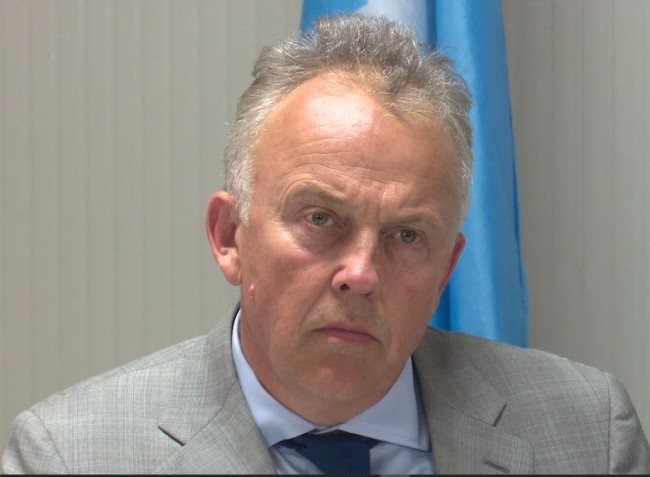EXCLUSIVE: Presidential decree on 2016 poll model was imperative for national interests- UN envoy Keating

The UN Special Envoy to Somalia Michael Keating has lauded the move by President Hassan Sheikh Mohamud to declare the 2016 electoral model law Sunday noting the decree was imperative for national interests.
In an exclusive interview with Goobjoog News, Keating said Sunday the decree in which the president by-passed parliament was necessary not only to meet set deadlines but also inspire momentum in Somalia’s political growth.
“I think it’s a very positive step because holding the election on time this year is essential to not only meet the expectations of Somalis but also to maintain the momentum around Somalia’s longer term political journey and to retain high level of international support,” said Keating.
Running out of options
Keating said the president chose to invoke executive powers to declare the electoral option law since he was running out of options and that it was increasingly becoming clear the House was not going to strike a consensus on some of the issues in the electoral proposals.
“It became apparent that parliament was not going to reach an agreement on the electoral model. That is because there are so many conflicting views among MPs about the electoral model and that in the national interest and in order to stick to the time line, I think he (the president) thought he had run out of options,” the envoy said.
President Mohamud Sunday decreed the 2016 electoral model which has been in parliament since April 30 law noting it was necessary to safeguard the interests of the country and various other stakeholders involved in the process.
UN support
Keating however said the UN was supportive of parliament and its role as a constitutional organ of the state but expressed dismay the House could not put its act together to reach an agreement on the electoral model in readiness for the August elections.
“From a UN perspective, we are very supportive on parliament and the role of parliament.” Ideally, Keating said, “Parliament should be able to rise above partisan and clan based politics in the national interest. The concern has been the difficulty in doing that.”
Keating added whereas it was understandable parliament was faced with challenges in reaching a consensus, additional time would only serve to stretch the debate endlessly.
“It is a missed opportunity but I don’t underestimate the difficulties the parliamentarians face in trying to agree on leglisation of the model. But genuinely the question was even if you gave them one more week, one more month, some people would even say longer, they might never have agreed, said Keating.
Challenges ahead
Going forward, the UN chief in Somalia said there were still a number of issues to be dealt with and that all stakeholders involved must not rest until the elections are successfully completed.
The elections of the Upper House are scheduled for July while that of the Lower House will take place in August. Both Houses will thereafter jointly sit to elect the new president in September.
Keating said practical measures must now but be put in place to ensure these timelines are met. This include the formation of the election vetting bodies at regional and federal level as well as the dispute resolution mechanism. Other issues to be dealt with, Keating noted include the number of days the electoral colleges have to meet in the federal state capitals to elect the Lower House MPs and the modalities for securing the 30% quota for women in both houses.
At one level, Keating noted are technical issues while on the other it involves political discussions.
He called on the National Leadership Forum meeting in Garowe, Puntland end of May to iron out all pending issues and more importantly do so in a transparent manner. “We hope there will be no delays and that the process of establishing all the necessary bodies to oversee the elections will be transparent otherwise it is going to be difficult,” he stated.